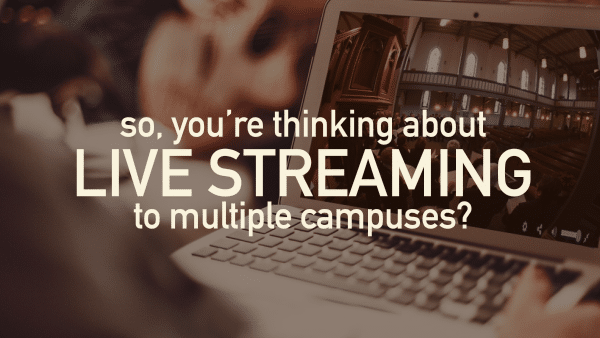
So you’re thinking about Livestreaming Video to multiple campuses?
I hope you’re not looking for tech answers here.
I can’t help with that. But I’d like to tell you a story of why I think video venues are not always the best answer.
One of our campuses at Ginghamsburg we like to call “The Fort”. Fort McKinley UMC holds deep roots in the Harrison Township neighborhood of West Dayton. At one time, it was a “thriving” middle-class (very white) church. Sometime post WWII, the neighborhood and Fort McKinley church began to change. Essentially, the white people fled to the suburbs. Of course, this was caused by and had effects on several other variables of life, but because this is a blog post and I’m sure PBS can explain it better, I’ll let you learn about white-flight and other issues of systemic division of people here.
Suggested Tweet: "Don't simply clone your main campus, each church is unique @danniobracken"
Fast forward to 2008, the neighborhood had become almost 100% black. The church was holding firm to its roots, however, and 30 elderly white folk were driving in from the suburbs for worship. As such, the church had been slowly dying (literally and figuratively), and there was zero connection to the neighborhood.
2008 was when Ginghamsburg was asked to intervene. It was pitched as a revitalization project. What’s interesting to me, is that reinventing The Fort as a “video venue” was never considered. Like, it never came to mind. It was probably understood, right from the start, that piping in more of the suburbs was a dumb idea. Ginghamsburg’s main campus is in Tipp City, Ohio. Tipp City is almost as white as you can get. 98% according to the latest study of demographics. Although Miami County is one of the fastest growing areas of poverty in the country, and despite Ginghamsburg Church’s decades-long commitment to diversity, our home was white. Coincidentally, our homes shape our language.
So let me ask a question: Is it possible, that a video venue can only clone the original campus?
Suggested Tweet: "Sibling churches have similar DNA, but are uniquely fit to meet the needs of their unique neighborhoods. @danniobracken"
At Fort McKinley, the first thing we did was ask the neighbors, “what would a great church in this neighborhood look like?”. Next, we listened (imagine that). We heard things like “GED tutoring” and “lively music” and a desire for community resources like “a safe place for my kids to be until I get home from work” and “sustainable gardening”. When the neighborhood started showing up for church (yes, we helped the organist resign in favor of a more black gospel oriented musical flavor), we quickly realized that our teaching prose and our lens through which we filtered scripture for Tipp City would grossly miss the mark. It was less theological and more cultural exegesis. Again, because this is a blog post, I encourage you to learn more about socioeconomic and class division from Ruby Payne. Essentially, the intricacies of our teaching language would not translate to our new urban brothers and sisters. Not only did we need a campus pastor to implement services critical to community health, but we needed an incarnational teacher. HAD WE simply piped in the message from Tipp City every week, I’m convinced we would have created Tipp City South, a micro community of white people blindly perpetuating whiteness and ignorantly furthering the isolation of the neighborhood’s poor.
Maybe you’re trying to clone your main campus. If so, great. Video venue all the way. But, is any one community the same? I’d rather have brothers and sisters than be cloned, wouldn’t you? Sibling churches have similar DNA, but are uniquely fit to meet the needs of their unique neighborhoods. Clone churches can only meet a single demographic.








